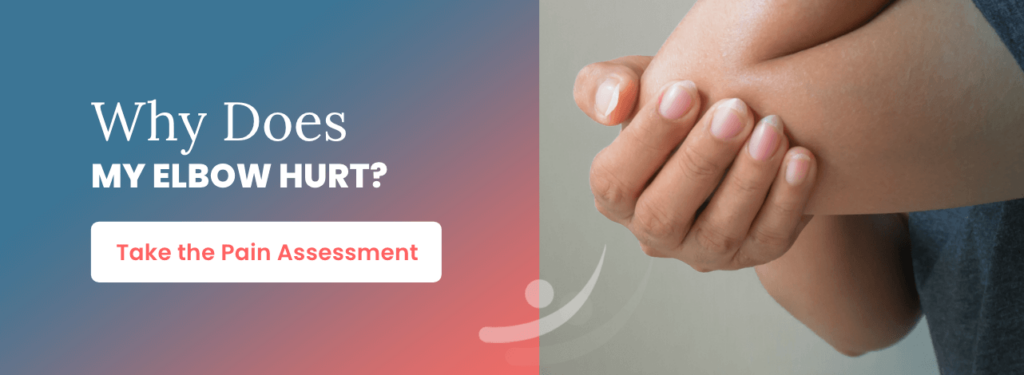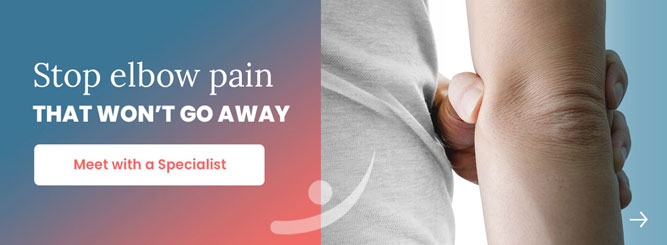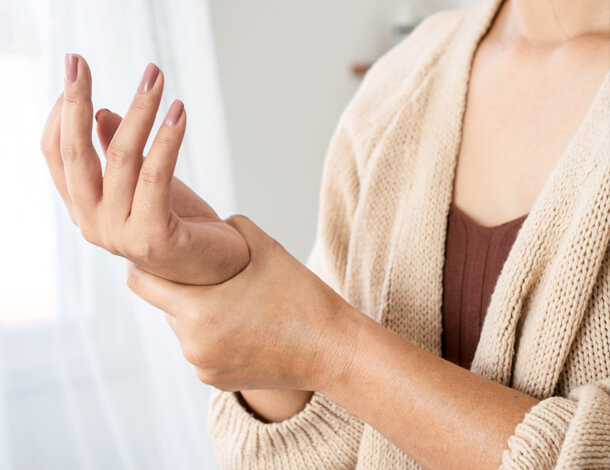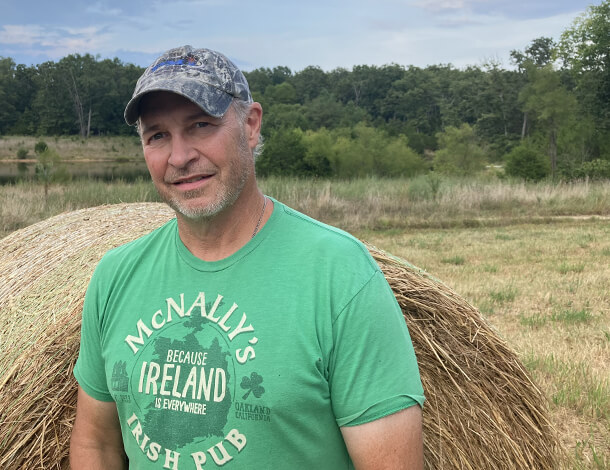Why You Shouldn’t Put Off Seeing an Elbow Pain Doctor When You Hurt

Minor or temporary pains in your elbow are common (like when you hit your funny bone on the edge of the table—ouch!), but ongoing pain or trouble moving your elbow might signal the need to see an elbow pain doctor.
There are many different potential causes of elbow pain, and the appropriate treatments depend on a range of factors that an elbow specialist can help determine.
Read on to learn about common elbow conditions and injuries and find out when to call an elbow pain doctor for an assessment.
Elbow Pain Causes
Elbow pain is classified as any pain originating from the structures in and around the elbow joint. There are two main risk factors for elbow pain: overuse of the joint or too much stress on the elbow joint.
Joint Overuse
Overuse of the elbow joint is most often seen in people who bend their elbows a lot at work or during sports (e.g., baseball and tennis) or other regular activities (e.g., dancing and weightlifting).
Repeated Stress or Trauma to the Elbow Joint
Too much stress on the elbow joint can lead to a ligament or tendon tear—or even dislocation or fracture in your elbow joint.
Car accidents, on-the-job mishaps, and injuries from playing sports are common causes of elbow trauma. Trauma to the elbow or repetitive stress may also result in swelling and nerve compression or entrapment.
Common elbow conditions and injuries include:
- Broken Elbows (Elbow Fractures)
- Bursitis
- Cartilage Tears
- Congenital Elbow Deformities
- Cubital Tunnel Syndrome
- Cysts
- Elbow Arthritis
- Elbow Dislocations
- Elbow Sprains
- Golfer’s Elbow
- Ligament Injuries, Instabilities, or Tears
- Little League Elbow
- LUCL Tears and MCL Tears
- Nerve Compression, Pain, or Injuries,
- Nursemaid’s Elbow
- Paralytic Deformities
- Pronator Syndrome
- Pulled Elbow (Nursemaid’s Elbow)
- Radial Tunnel Syndrome
- Repetitive Stress Injuries
- Tendonitis
- Tendon Injuries, Lacerations, or Transfers
- Tennis Elbow
- Tumors
At-Home Elbow Pain Treatments
Most of the time, elbow pain will go away on its own with rest and at-home treatment. If you’re feeling some minor elbow soreness, you can try these before calling an elbow pain doctor:
- Rest. Stop doing any activities that contribute to your elbow pain and limit the use of your elbow.
- Heat. Apply a heating pad or hot pack around your elbow. Heat can promote blood flow and encourage healing.
- Over-the-Counter Medication. NSAIDs, like ibuprofen, can help with your pain and reduce inflammation.
- Stretching. Regularly stretching the muscles of your forearm can sometimes help reduce elbow pain.
- Bracing. An arm brace will immobilize your elbow and allow whatever is causing your pain to heal. You can find one at most drugstores.

Why Should You See an Elbow Pain Specialist?
It can be tricky to know if and when your elbow pain will go away on its own and when you should see an elbow pain doctor.
If you’ve tried the at-home remedies listed above and they haven’t helped or if you are experiencing any of the following symptoms, schedule an appointment with a specialist right away:
- Ongoing or worsening pain that develops over time
- Dull or achy pain when you move your elbow
- Pain in your elbow even when you’re at rest
- Elbow pain that keeps you up at night
- Numbness or tingling in your arm
- You can’t bend or straighten your elbow
If you’re experiencing any of these more severe symptoms, don’t wait for an appointment with an elbow pain doctor. Get immediate medical attention at an urgent care clinic or emergency room if:
- You’re unable to move your arm
- You have extreme pain at the site of the injury
- There is noticeable swelling or bruising in and around your elbow
- Your elbow is dislocated
- Your elbow has an obvious deformity
Diagnosis and Treatment
An elbow pain doctor can diagnose what’s causing your elbow pain and work with you to create a personalized care plan to manage your symptoms and help you feel better. They will examine your elbow and may order imaging tests like an X-ray, MRI, or ultrasound.
Depending on your diagnosis, your elbow specialist may recommend conservative treatments to start, including:
- Anti-Inflammatory Diet
- Edema (Swelling) Control
- Heat or Cold Therapy
- NSAIDs
- Stretches
- Therapy
- Injections
If these conservative treatments don’t help or you have a more severe condition or injury, your elbow pain doctor might recommend elbow surgery.
Learn How A Precise Elbow Replacement Helps Judy Stay Active
See an IHTSC Elbow Pain Doctor
When elbow problems caused by an injury or persistent condition keep you from working or doing your usual activities, a doctor specializing in elbow problems can help you get the relief you need.
At Indiana Hand to Shoulder Center, our elbow pain doctors provide convenient care for a wide range of disorders. We treat all elbow injuries and conditions.

You might also like:
Disclaimer: The materials on this website have been prepared for informational purposes only and do not constitute advice. You should not act or rely upon any medical information on this website without a physician’s advice. The information contained within this website is not intended to serve as a substitution for a thorough examination from a qualified healthcare provider. The display of this information is not intended to create a health care provider-patient relationship between the Indiana Hand to Shoulder Center and you.



